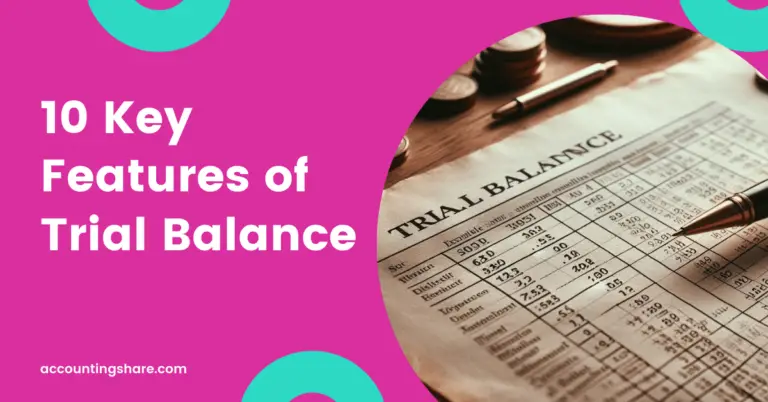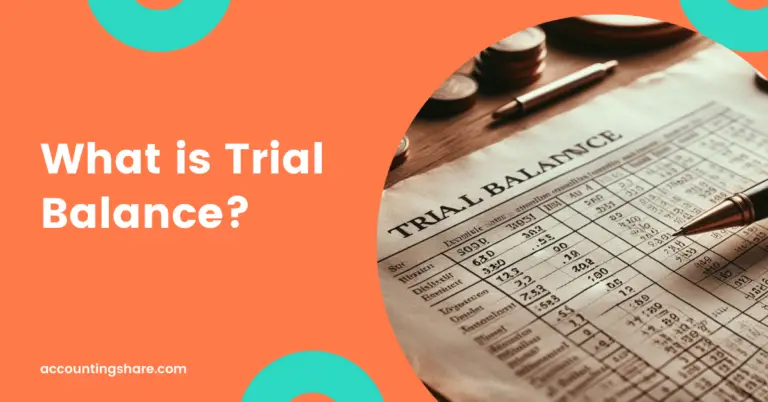Format of a Trial Balance [With PDF]
A trial balance has a simple format that lists the balances of all general ledger accounts in one place. This format helps to ensure that total debits equal total credits, which is a basic accounting principle.
Here’s a detailed guide to the trial balance format, along with examples to make it easier to understand.
Structure of a Trial Balance
A trial balance is typically structured in a tabular format with several key components:
- Heading
- Account Titles
- Account Balances
- Total Debits and Credits
1. Heading
The heading of a trial balance is essential, providing context and information about the period covered. The heading usually includes three lines:
- Company Name
- Title (“Trial Balance”)
- Date
Example Heading:
XYZ Corporation
Trial Balance
As of December 31, 2023
2. Account Titles
Under the heading, list all the accounts from the general ledger. These accounts are typically listed in the following order:
- Assets
- Liabilities
- Equity
- Revenues
- Expenses
Each account should have its name clearly stated.
Example Account Titles:
Cash
Accounts Receivable
Supplies
Accounts Payable
Common Stock
Service Revenue
Rent Expense
3. Account Balances
Next to each account title, two columns are provided to enter the balances: one for debits and one for credits.
Each account will have a balance in either the debit column or the credit column, but not both.
Example:
| Account Title | Debit ($) | Credit ($) |
|---|---|---|
| Cash | 5,000 | |
| Accounts Receivable | 2,500 | |
| Supplies | 1,000 | |
| Accounts Payable | 1,200 | |
| Common Stock | 5,000 | |
| Service Revenue | 3,500 | |
| Rent Expense | 1,200 |
4. Total Debits and Credits
At the bottom of the trial balance, total the debit and credit columns. These totals should be equal if the trial balance is correct.
Example:
| Account Title | Debit ($) | Credit ($) |
|---|---|---|
| Cash | 5,000 | |
| Accounts Receivable | 2,500 | |
| Supplies | 1,000 | |
| Accounts Payable | 1,200 | |
| Common Stock | 5,000 | |
| Service Revenue | 3,500 | |
| Rent Expense | 1,200 | |
| Total | 9,700 | 9,700 |
Detailed Example of a Trial Balance
Let’s put it all together with a detailed example.
XYZ Corporation
Trial Balance
As of December 31, 2023
| Account Title | Debit ($) | Credit ($) |
|---|---|---|
| Cash | 5,000 | |
| Accounts Receivable | 2,500 | |
| Supplies | 1,000 | |
| Prepaid Insurance | 600 | |
| Equipment | 8,000 | |
| Accounts Payable | 1,200 | |
| Notes Payable | 4,000 | |
| Common Stock | 5,000 | |
| Retained Earnings | 7,200 | |
| Service Revenue | 3,500 | |
| Rent Expense | 1,200 | |
| Salaries Expense | 2,000 | |
| Utilities Expense | 600 | |
| Total | 20,900 | 20,900 |
In this detailed example:
- All account titles are listed, with balances displayed in either the debit or credit columns.
- The total debit ($20,900) equals the total credit ($20,900), indicating the accuracy of ledger entries.
Summary
The format of a trial balance includes a clear heading, a list of account titles, and columns for debit and credit balances.
The purpose of the trial balance is to ensure that the total debits equal the total credits, confirming the accuracy of the ledger entries.
By following this format, accountants can systematically verify and correct their financial records, maintaining accurate and reliable financial statements.
You can also read:
- 10 key features of trial balance [With PDF]
- 10 key benefits of trial balance [With PDF]
- How to prepare a trial balance [With PDF]




![7 Important Limitations of Trial Balance [With PDF]](https://accountingshare.com/wp-content/uploads/2024/06/7-important-limitations-of-trial-balance-768x402.png)


